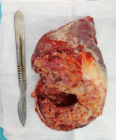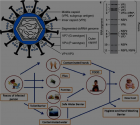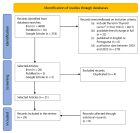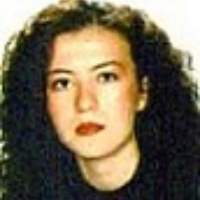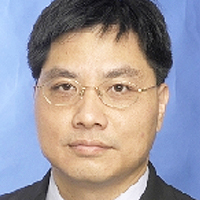Abstract
Case Report
Herpes simplex virus (HSV)-1 encephalitis can induce chronic anti-N-methyl-D-aspartate receptor (NMDAR) encephalitis
Susanne Buechner*, Gabriele J Sixt and Igor Florio
Published: 27 July, 2018 | Volume 2 - Issue 2 | Pages: 033-038
Herpes simplex virus (HSV)-1 encephalitis is the most common infectious cause of sporadic encephalitis. Despite treatment with acyclovir, HSV encephalitis is still associated with severe morbidity characterized by persistent neurological deficits. HSV encephalitis usually follows a monophasic course, however, some patients might develop relapsing symptoms caused by the formation of auto-antibodies directed against the N-methyl-D-aspartate receptor (NMDAR). Here we present an 82-year-old male patient with HSV encephalitis who developed shortly after his hospital discharge a Post-HSV NMDAR encephalitis, characterized by recurrent epileptic seizures and deterioration of his residual aphasia. First-line immunotherapy with intravenous immunoglobulins (IgIV) was administered and the patient returned almost to his baseline residual deficits of HSV encephalitis. Subsequently, he presented with recurrent relapses of NMDAR encephalitis. Since periodic treatment with IgIV has been started the patient is seizure-free and his neuropsychiatric condition is stable. In conclusion, the recognition of Post-HSV NMDAR encephalitis is very important because neurological manifestations can markedly improve with immunotherapy. Interestingly, in some patients cerebral HSV infection seems to trigger a chronic inflammatory disorder with persistent autoimmune activation which requires chronic treatment.
Read Full Article HTML DOI: 10.29328/journal.jnnd.1001012 Cite this Article Read Full Article PDF
Keywords:
Herpes simplex virus-1 encephalitis; Anti-NMDA receptor encephalitis; Post-viral autoimmune encephalitis; Epileptic seizures; Immunotherapy
References
- Bradshaw MJ, Venkatesan A. Herpes Simplex Virus-1 Encephalitis in Adults: Pathophysiology, Diagnosis, and Management. Neurotherapeutics. 2016; 13: 493-508. Ref.: https://tinyurl.com/y896nyme
- Nosadini M, Mohammad SS, Corazza F, Ruga EM, Kavitha Kothur, et al. Herpes simplex virus-induced anti-N-methyl-D-aspartate receptor encephalitis: a systemic literature review with analysis of 43 cases. Developmental Medicine & Child Neurology. 2017; 59: 796-805. Ref.: https://tinyurl.com/y9qoyq2r
- Armangue T, Moris G, Cantarin-Extremera V, Conde CE, Rostasy K, et at. Autoimmune post-herpes simplex encephalitis of adults and teenagers. Neurology. 2015; 85: 1736-1743. Ref.: https://tinyurl.com/y9r6hdfs
- Westman G, Studahl M, Ahlm C, Eriksson BM, Persson B, et al. N-methyl-D-aspartate receptor autoimmunity affects cognitive performance in herpes simplex encephalitis. Clin Microbiol Infect. 2016; 22: 934-940. Ref.: https://tinyurl.com/yd8m4na3
- Kovac S, Alferink J, Ahmetspahic D, Arolt V, Melzer N. Update Anti-N-Methyl-D-Aspartat-Rezeptor-Enzephalitis. Nervenarzt. 2018; 89: 99-112. Ref.: https://tinyurl.com/y9np7ye4
- Bien CG, Bauer J. Autoimmune Epilepsies. Neurotherapeutics. 2014; 11: 311-318. Ref.: https://tinyurl.com/y7hgfc2e
- Schein F, Gagneux-Brunon A, Antoine JC, Lavernhe S, Pillet S, et al. Anti-N-methyl-D-aspartate receptor encephalitis after Herpes simplex virus-associated encephalitis: an emerging disease with diagnosis and therapeutic challenges. Infection. 2017; 45: 545-549. Ref.: https://tinyurl.com/ycjcvyrd
- Linnoila JJ, Binnicker MJ, Majed M, Klein CJ, McKeon A. CSF herpes virus and autoantibody profiles in the evaluation of encephalitis. Neurol Neuroimmunol Neuroinflamm. 2016; 3: e245. Ref.: https://tinyurl.com/y8l4mlsb
- Popkirov S, Ismail FS, Grönheit W, Kapauer M, Wellmer J, et al. Progressive hippocampal sclerosis after viral encephalitis: Potential role of NMDA receptor antibodies. Seizure. 2017; 51: 6-8. Ref.: https://tinyurl.com/y83qkcmo
- Omae T, Saito Y, Tsuchie H, Ohno K, Maegaki Y, et al. Cytokine/chemokine elevation during the transition phase from HSV encephalitis to autoimmune anti-NMDA receptor encephalitis. Brain Dev. 2018; 40: 361-365. Ref.: https://tinyurl.com/yaqahfqb
Figures:

Figure 1
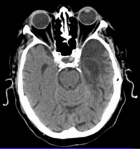
Figure 2
Similar Articles
-
Herpes simplex virus (HSV)-1 encephalitis can induce chronic anti-N-methyl-D-aspartate receptor (NMDAR) encephalitisSusanne Buechner*,Gabriele J Sixt,Igor Florio. Herpes simplex virus (HSV)-1 encephalitis can induce chronic anti-N-methyl-D-aspartate receptor (NMDAR) encephalitis. . 2018 doi: 10.29328/journal.jnnd.1001012; 2: 033-038
-
Stroke Mimics: Insights from a Retrospective Neuroimaging StudyLucia Monti*, Davide del Roscio, Francesca Tutino, Tommaso Casseri, Umberto Arrigucci, Matteo Bellini, Maurizio Acampa, Sabina Bartalini, Carla Battisti, Giovanni Bova, Alessandro Rossi. Stroke Mimics: Insights from a Retrospective Neuroimaging Study. . 2023 doi: 10.29328/journal.jnnd.1001083; 7: 094-103
-
Navigating Neurodegenerative Disorders: A Comprehensive Review of Current and Emerging Therapies for Neurodegenerative DisordersShashikant Kharat*, Sanjana Mali*, Gayatri Korade, Rakhi Gaykar. Navigating Neurodegenerative Disorders: A Comprehensive Review of Current and Emerging Therapies for Neurodegenerative Disorders. . 2024 doi: 10.29328/journal.jnnd.1001095; 8: 033-046
Recently Viewed
-
Addiction to self-strangulation: a case-reportAurely Ameller*,Yann Le Strat,Marion Cadranel,Celine Portalier, Caroline Dubertret. Addiction to self-strangulation: a case-report . J Addict Ther Res. 2017: doi: 10.29328/journal.jatr.1001003; 1: 016-021
-
Nanoencapsulated Extracts from Leaves of Bauhinia forficata Link: In vitro Antioxidant, Toxicogenetic, and Hypoglycemic Activity Effects in Streptozotocin-induced Diabetic MiceBárbara Verônica Cardoso de Souza, Alessandra Braga Ribeiro*, Rita de Cássia Meneses Oliveira, Julianne Viana Freire Portela, Ana Amélia de Carvalho Melo Cavalcante, Esmeralda Maria Lustosa Barros, Luís Felipe Lima Matos, Tarsia Giabardo Alves, Maria. Nanoencapsulated Extracts from Leaves of Bauhinia forficata Link: In vitro Antioxidant, Toxicogenetic, and Hypoglycemic Activity Effects in Streptozotocin-induced Diabetic Mice. Arch Pharm Pharma Sci. 2024: doi: 10.29328/journal.apps.1001063; 8: 100-115
-
Oral Suspension as Versatile Galenic Formulation in PediatryMauro Luisetto*, Almukthar N, Edbey K, Mashori GR, Fiazza C, Dona’ l, Cabianca L, Latyshev O. Oral Suspension as Versatile Galenic Formulation in Pediatry. Arch Pharm Pharma Sci. 2024: doi: 10.29328/journal.apps.1001062; 8: 091-099
-
Modulation of Microbiota and its Impact on DepressionKousik Maparu*. Modulation of Microbiota and its Impact on Depression. Arch Pharm Pharma Sci. 2024: doi: 10.29328/journal.apps.1001061; 8: 089-090
-
Experiences of Consumers on the Health Effects of Fake and Adulterated Medicines in NigeriaChijioke M Ofomata, Nkiru N Ezeama, Chinelo Ezejiegu*. Experiences of Consumers on the Health Effects of Fake and Adulterated Medicines in Nigeria. Arch Pharm Pharma Sci. 2024: doi: 10.29328/journal.apps.1001059; 8: 075-081
Most Viewed
-
Evaluation of Biostimulants Based on Recovered Protein Hydrolysates from Animal By-products as Plant Growth EnhancersH Pérez-Aguilar*, M Lacruz-Asaro, F Arán-Ais. Evaluation of Biostimulants Based on Recovered Protein Hydrolysates from Animal By-products as Plant Growth Enhancers. J Plant Sci Phytopathol. 2023 doi: 10.29328/journal.jpsp.1001104; 7: 042-047
-
Sinonasal Myxoma Extending into the Orbit in a 4-Year Old: A Case PresentationJulian A Purrinos*, Ramzi Younis. Sinonasal Myxoma Extending into the Orbit in a 4-Year Old: A Case Presentation. Arch Case Rep. 2024 doi: 10.29328/journal.acr.1001099; 8: 075-077
-
Feasibility study of magnetic sensing for detecting single-neuron action potentialsDenis Tonini,Kai Wu,Renata Saha,Jian-Ping Wang*. Feasibility study of magnetic sensing for detecting single-neuron action potentials. Ann Biomed Sci Eng. 2022 doi: 10.29328/journal.abse.1001018; 6: 019-029
-
Pediatric Dysgerminoma: Unveiling a Rare Ovarian TumorFaten Limaiem*, Khalil Saffar, Ahmed Halouani. Pediatric Dysgerminoma: Unveiling a Rare Ovarian Tumor. Arch Case Rep. 2024 doi: 10.29328/journal.acr.1001087; 8: 010-013
-
Physical activity can change the physiological and psychological circumstances during COVID-19 pandemic: A narrative reviewKhashayar Maroufi*. Physical activity can change the physiological and psychological circumstances during COVID-19 pandemic: A narrative review. J Sports Med Ther. 2021 doi: 10.29328/journal.jsmt.1001051; 6: 001-007

HSPI: We're glad you're here. Please click "create a new Query" if you are a new visitor to our website and need further information from us.
If you are already a member of our network and need to keep track of any developments regarding a question you have already submitted, click "take me to my Query."






